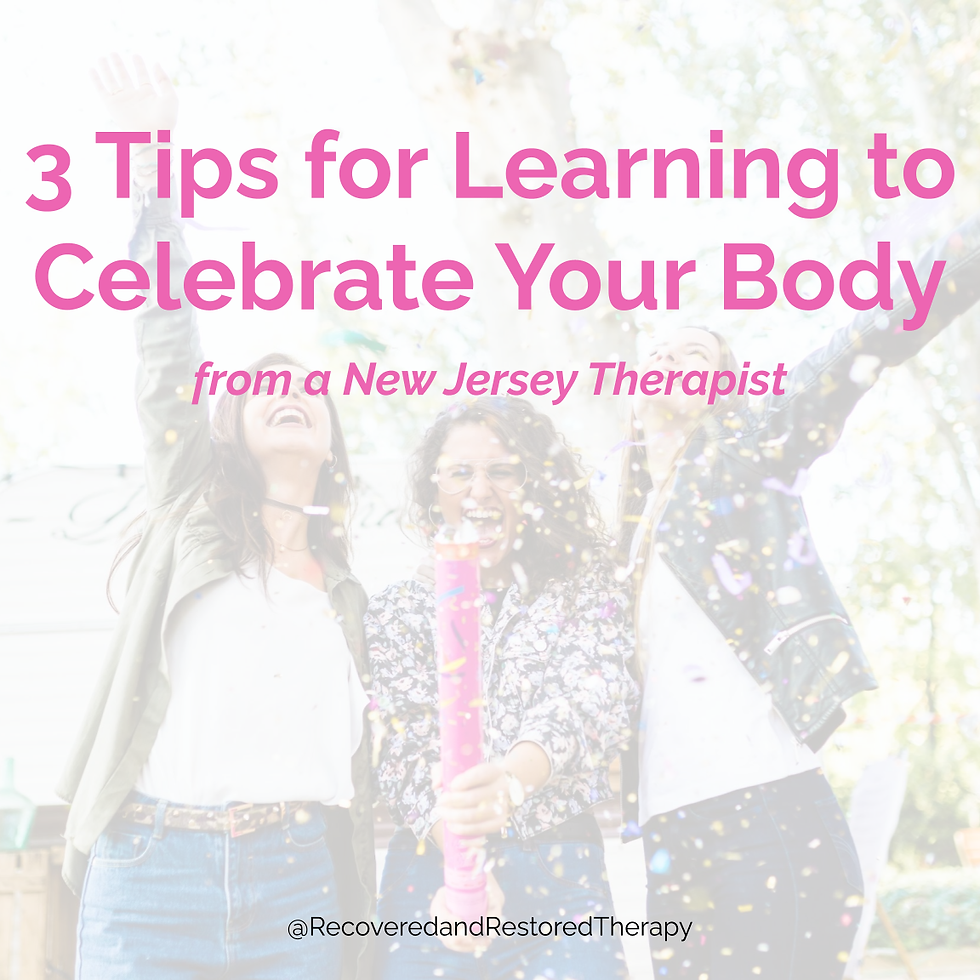3 Tips for Learning to Celebrate Your Body from a New Jersey Therapist
- Gabrielle Morreale
- Apr 25, 2023
- 8 min read
Updated: Jan 23

By: Dana Kippen, Clinical Intern
If you’re reading the title of this blog and thinking to yourself, “Celebrate my body? That’s absurd!” then this post is for you! By the time you finish this mini-read, it’s my hope that your mindset has at least shifted from “there’s no way,” to “well, it’s worth a shot!” or even better, “maybe these could actually help me!” If not, that’s okay too. We still think that planting the seeds for body neutrality and body trust is worthwhile, and that’s our main goal - even if it takes more than one blog post to convince you! And as recovered clinicians ourselves, we are here to tell you that these tips can really make a difference, even if you’re hesitant at first. So, what’re you waiting for? Let’s get started!
Tip #1:
Become mindful of your own biases and negative self-talk about your body.
While you might think, “What does this have to do with celebrating my body?” we can’t stress enough how ESSENTIAL this piece of the puzzle is! Understanding our own biases around weight, appearance, and food, as well as becoming mindful of our inner monologue – including how our thoughts make us feel, how they influence our behaviors, and what purpose they are serving – is the first step towards re-writing our body image narrative. Unlearning harmful diet culture messages, working to challenge standards of beauty, and becoming kinder to ourselves internally are crucial in recovery, and in celebrating our bodies!
Let’s walk through an example together of what this could look like on a typical day, and how it can help us become more compassionate and caring towards our bodies. Picture this: you’re getting dressed for the day, looking in the mirror, and you have the thought, “I look so fat today, I have to start dieting again.” First and foremost, taking a pause in this moment is crucial. Noticing that we are having this thought in a conscious, intentional way, can bring it into our awareness, and subsequently, allow us to become more in control of it. Once you notice the thought, try not to pass judgment on it, but instead, try asking yourself, “Where is this thought actually coming from?” Maybe the thought comes from someone in your life who has echoed it. Maybe it comes from social media pages that promote diet culture and fatphobia. Maybe it comes from lived experiences in a larger body that left you feeling ashamed or unhappy. Recognizing where we learned to think these things about our bodies, and about the way we “should” strive to look, is important in being able to understand how our biases formed and how to unlearn them.
Once we are able to pause, notice/name the thought, and identify where the bias or judgment might be coming from, we can then ask ourselves, “How does the thought ‘I am so fat, I have to start dieting again’ serve me?” The answer is: it doesn’t! This thought not only reinforces anti-fat bias and diet culture messaging but also does nothing except tear you down. In a world that so often does that for us, does it serve us to perpetuate this harm toward our own bodies? No, of course not!
So, if you are able to recognize that the thought is coming from a place of previous hurt, unhelpful societal expectations, or internalized body shame and that it is NOT serving you, what can you do about it? I’m so glad you asked! At the end of all this, you can try to replace the negative self-talk with a body-neutral affirmation or try speaking to yourself the way you would speak to a loved one having that same thought. An example of a helpful body-neutral affirmation in this moment could be “I am so much more than a body,” or “My worth is not determined by my appearance.” An example of something you might tell a loved one could also be, “You are good enough the way you are, you don’t need to change.”
While I know this may seem like a lot of steps, in reality, this entire mindfulness process only takes seconds to accomplish, and can be done wherever, whenever! It can be as simple as the following mini-internal dialogue:
Question 1: “I’m having the thought x. Where is it coming from?”
Response: “I’ve definitely heard/seen/been told x, and I have internalized it”
Question 2: “Is it helpful for me to think x?”
Response: “No, it makes me feel bad/ashamed/unworthy/inadequate, etc.”
Question 3: “What can I say to myself instead?”
Response: “All bodies are good bodies, and mine is no exception.”
Tip #2:
Start doing things that make your body feel good physically every day.
We’ve already discussed why self-talk about our body matters, and now we are going to discuss the way our bodies physically feel. Overall, the premise behind this tip is pretty simple: starting to celebrate our bodies means giving them permission to feel good physically! It is much harder to feel good about our bodies when we feel bad physically, and vice versa. And, if you’re still thinking to yourself, “There’s no way I can do any of this,” we are here to tell you that this step is really simple and that there are a thousand different ways to practice and achieve it!

One easy, great way to make our bodies feel good is to dress comfortably. Trying to squeeze our bodies into clothes that don’t fit us, or clothes that are physically uncomfortable (ex. scratchy/itchy fabric) will only make us feel worse! This is no way to begin honoring or celebrating them. Wearing clothes that fit, and that feels good on, makes it easier for us to get through the day doing all the things we need to do, and can also increase our confidence while doing them. Increased confidence = increased ability to celebrate the bodies we are in! And, as an important reminder, we aren’t meant to fit clothes, clothes are meant to fit us. You never have to change your body to fit into something, and you are allowed to get rid of clothes that used to fit and don’t any more! Our bodies grow and change, just like our individual styles, and that is beautiful! Plus, what better way to celebrate the body you’re in right now than taking it for a mini shopping spree?!
Another piece of ensuring your body feels physically good is to tune into and honor its wants and needs. This could look like taking a nap to reset, making sure you have enough time to take a break and rest throughout the day, and nourishing your body with enough food to bring you consistent satisfaction and fullness. Our bodies can’t feel physically good, and we can’t celebrate our bodies if we are depriving them of their most basic needs: nourishment & rest. When we begin to listen to and honor our body’s needs, we are re-learning to trust our bodies, and undoing the disconnection that diet culture often creates within us. Celebrating these wins is so important, too!
Lastly, finding activities that make your body feel good, whether it be through joyful movement, self-care, meditation, or additional things that engage your body physically in a pleasant, gentle way can be helpful in keeping your body, mind, and spirit happy! Trying things like yoga, breathing and meditative techniques, going for walks outside with loved ones or pets, gently stretching out, getting a massage, or practicing skin care, can all be new and fun ways to treat your body with kindness and celebrate your body, instead of manipulating or trying to change it! Finding what works for you is about trial and error, but in the process, you will be learning what feels good for you, and how to celebrate your body in an individualized way!
Tip #3:
Practice gratitude for all the things your body does for you.
This last tip, which on the surface may seem silly or cliche, is the most direct way to begin learning how to celebrate your body! This is a huge piece of fostering body neutrality, and if it feels unnatural at first, well, that’s the point! We don’t consciously appreciate the little things our body does for us every day, and if we did, it would become a lot harder to constantly criticize it. So, practicing this type of intentional gratitude can help us to re-wire the way we think about our bodies, and unlearn the idea that our bodies only deserve to be celebrated for their appearance. In fact, it’s quite the opposite!
Here are a few mini prompts that you can use every day to practice gratitude for your body. You can write down your responses, answer them out loud, or even just think them to yourself:
What are three things my body allowed me to do today that I enjoyed?
What do I appreciate about my body, and why?
How does my body protect me?
Outside of appearance, what are the benefits of living in my body?

Hopefully, after answering one or all of these prompts, you are able to see a few things your body does for you that you may not have thought about otherwise. This is inherently a celebration of your body, as appreciating it for the way it serves you can free you from the restraints of diet culture, which tells us that our bodies only have worth in their appearance, shape, and size.
We know that these tips still may feel a bit daunting to incorporate into your daily life, but with practice and repetition, they will become easier and even start to feel natural! Shifting the way, we talk to ourselves about our bodies, the way we allow them to feel, and the ways we intentionally appreciate them are all key to learning to celebrate the bodies we have! It is still my hope that you leave this blog post feeling empowered to try incorporating some of these tips, as celebrating your body, regardless of appearance or size, shouldn’t be stigmatized or shameful, and IS possible for everyone! We believe in you!
Other Mental Health Services Offered in PA, NJ, DE, SC, MD, CT, VT, and FL
We offer a wide variety of services related to eating disorder recovery including trauma therapy! We offer Weekly Support Groups, Nutrition Services, and Family and Parent Therapy as well as Coaching, all tailored to meet the specific needs of the individual. We offer our services for Anorexia, Bulimia, Binge Eating, and Orthorexia as well as Maternal Mental Health, and eating disorder therapy for athletes online in New Jersey, Delaware, South Carolina, Maryland, Florida, Vermont, and Connecticut! We are here to offer our support and understanding in a safe and non-judgmental environment.
We have immediate openings right now for eating disorder therapy in:
Delaware, New Jersey, Florida, Maryland South Carolina, Connecticut, Vermont, and Pennsylvania.
And recovery coaching worldwide.
Recovered and Restored is an eating disorder therapy center founded by Gabrielle Morreale, LPC. We specialize in helping teens and young women heal from eating disorders such as anorexia, bulimia, orthorexia, and binge eating disorder and treat disordered eating, anxiety, depression, and PTSD. We provide eating disorder therapy in the towns of Horsham, Upper Gwynedd, Lower Gwynedd, North Wales, Lansdale, Hatfield, Blue Bell, Doylestown, and nearby towns with eating disorder therapy. Also providing virtual eating disorder therapy in New Jersey, Delaware, and Florida. Some towns served virtually but are not limited to Pittsburg, Lancaster, Harrisburg, Center City, Cherry Hill, Haddonfield, Mount Laurel, Cape May, Avalon, Brick, Dover, New Castle, Bethany Beach, Marydel, and Oceanview





Comments